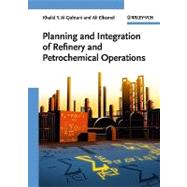
Planning and Integration of Refinery and Petrochemical Operations
by Al-Qahtani, Khalid Y.; Elkamel, Ali-

This Item Qualifies for Free Shipping!*
*Excludes marketplace orders.
Buy New
Rent Textbook
Used Textbook
We're Sorry
Sold Out
eTextbook
We're Sorry
Not Available
How Marketplace Works:
- This item is offered by an independent seller and not shipped from our warehouse
- Item details like edition and cover design may differ from our description; see seller's comments before ordering.
- Sellers much confirm and ship within two business days; otherwise, the order will be cancelled and refunded.
- Marketplace purchases cannot be returned to eCampus.com. Contact the seller directly for inquiries; if no response within two days, contact customer service.
- Additional shipping costs apply to Marketplace purchases. Review shipping costs at checkout.
Summary
Author Biography
Table of Contents
| Background | |
| Petroleum Refining and Petrochemical Industry Overview | |
| Refinery Overview | |
| Mathematical Programming in Refining | |
| Refinery Configuration | |
| Petrochemical Industry Overview | |
| Petrochemical Feedstock | |
| Refinery and Petrochemical Synergy Benefits | |
| Deterministic Planning Models | |
| Petroleum Refinery Planning | |
| Production Planning and Scheduling | |
| Operations Practices in the Past | |
| Types of Planning Models | |
| Regression-Based Planning: Example of the Fluid Catalytic Cracker | |
| Artificial-Neural-Network-Based Modeling: Example of Fluid Catalytic Cracker | |
| Yield Based Planning: Example of a Single Refinery | |
| General Remarks | |
| Multisite Refinery Network Integration and Coordination | |
| Introduction | |
| Literature Review | |
| Problem Statement | |
| Model Formulation | |
| Illustrative Case Study | |
| Conclusion | |
| Petrochemical Network Planning | |
| Introduction | |
| Literature Review | |
| Model Formulation | |
| Illustrative Case Study | |
| Conclusion | |
| Multisite Refinery and Petrochemical Network Integration | |
| Introduction | |
| Problem Statement | |
| Model Formulation | |
| Illustrative Case Studies | |
| Conclusion | |
| Planning Under Uncertainty | |
| Planning Under Uncertainty For a Single Refinery Plant | |
| Introduction | |
| Problem Definition | |
| Deterministic Model Formulation | |
| Stochastic Model Formulation | |
| Analysis Methodology | |
| Illustrative Case Study | |
| General Remarks | |
| Robust Planning of Multisite Refinery Networks | |
| Introduction | |
| Literature Review | |
| Model Formulation | |
| Sample Average Approximation (SAA) | |
| Illustrative Case Study | |
| Conclusion | |
| Robust Planning for Petrochemical Networks | |
| Introduction | |
| Model Formulation | |
| Value to Information and Stochastic Solution | |
| Illustrative Case Study | |
| Conclusion | |
| Stochastic Multisite Refinery and Petrochemical Network Integration | |
| Introduction | |
| Model Formulation | |
| Scenario Generation | |
| Illustrative Case Study | |
| Conclusion | |
| Two-Stage Stochastic Programming | |
| Chance Constrained Programming | |
| SAA Optimal Solution Bounding | |
| Table of Contents provided by Publisher. All Rights Reserved. |
An electronic version of this book is available through VitalSource.
This book is viewable on PC, Mac, iPhone, iPad, iPod Touch, and most smartphones.
By purchasing, you will be able to view this book online, as well as download it, for the chosen number of days.
Digital License
You are licensing a digital product for a set duration. Durations are set forth in the product description, with "Lifetime" typically meaning five (5) years of online access and permanent download to a supported device. All licenses are non-transferable.
More details can be found here.
A downloadable version of this book is available through the eCampus Reader or compatible Adobe readers.
Applications are available on iOS, Android, PC, Mac, and Windows Mobile platforms.
Please view the compatibility matrix prior to purchase.
